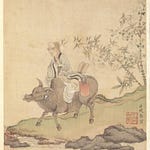Sundays with Seneca
Welcome to Sundays with Seneca on the Perennial Meditations podcast. Join the search for ancient lessons on the art of living from the writings and Stoic philosophy of Lucius Annaeus Seneca.
Today’s episode is available to all subscribers. If you’d like our Sundays with Seneca episode each week, along with more than 100 other meditations on the art of living, consider becoming a member today.
Endurance of Suffering
In a letter known today as On Ill-Health and Endurance of Suffering, Seneca wrote,
If I may begin with a commonplace remark, spring is gradually disclosing itself; but though it is rounding into summer, when you would expect hot weather, it has kept rather cool, and one cannot yet be sure of it. For it often slides back into winter weather. Do you wish to know how uncertain it still is? I do not yet trust myself to a bath that is absolutely cold; even at this time, I break its chill. You may say that this is no way to show the endurance either of heat or of cold; very true, dear Lucilius, but at my time of life, one is at length contented with the natural chill of the body. I can scarcely thaw out in the middle of summer. Accordingly, I spend most of the time bundled up; and I thank old age for keeping me fastened to my bed. Why should I not thank old age on this account? That which I ought not to wish to do, I lack the ability to do. Most of my converse is with books. Whenever your letters arrive, I imagine that I am with you, and I have the feeling that I am about to speak my answer instead of writing it. Therefore let us together investigate the nature of this problem of yours, just as if we were conversing with one another.
You ask me whether every good is desirable. You say: “If it is a good to be brave under torture, to go to the stake with a stout heart, to endure illness with resignation, it follows that these things are desirable. But I do not see that any of them is worth praying for. At any rate, I have as yet known of no man who has paid a vow by reason of having been cut to pieces by the rod, or twisted out of shape by the gout, or made taller by the rack.”
Seneca continues,
My dear Lucilius, you must distinguish between these cases; you will then comprehend that there is something in them that is to be desired. I should prefer to be free from torture, but if the time comes when it must be endured, I shall desire that I may conduct myself therein with bravery, honor, and courage. Of course, I prefer that war should not occur; but if war does occur, I shall desire that I may nobly endure the wounds, the starvation, and all that the demands of war bring. … The conclusion is not that hardships are desirable but that virtue is desirable, which enables us patiently to endure hardships. […]
When one endures torture bravely, one is using all the virtues. Endurance may perhaps be the only virtue that is on view and most manifest, but bravery is there too, and endurance and resignation and long-suffering are its branches. There, too, is foresight; for without foresight, no plan can be undertaken; it is foresight that advises one to bear as bravely as possible the things one cannot avoid. There also is steadfastness, which cannot be dislodged from its position, which the wrench of no force can cause to abandon its purpose. There is the whole inseparable company of virtues; every honorable act is the work of one single virtue, but it is in accordance with the judgment of the whole council. And that which is approved by all the virtues, even though it seems to be the work of one alone, is desirable.
The Stoic Attalus was wont to say: “I should prefer that Fortune keep me in her camp rather than in the lap of luxury. If I am tortured but bear it bravely, all is well; if I die but die bravely, it is also well.” …
Seneca concludes, “Why should I not regard this as desirable—not because the fire burns me, but because it does not overcome me? Nothing is more excellent or more beautiful than virtue; whatever we do in obedience to her orders is both good and desirable. Farewell.”
—
Thank you for listening; I hope you found something useful.
Until next time, be wise and be well,
















Seneca | The Endurance of Suffering